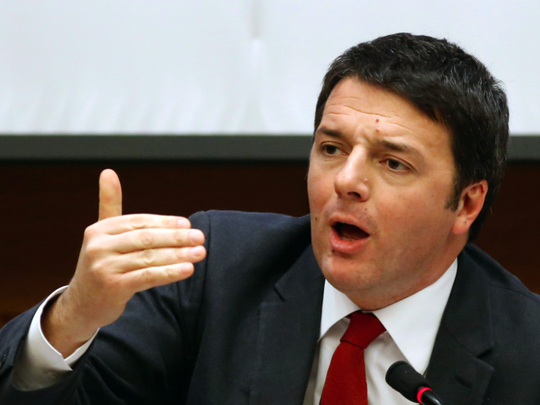
In George Bernard Shaw’s 1929 political comedy The Apple Cart, King Magnus of England threatens to turn the constitution upside down by abdicating his throne and standing for election against his own ministers. Fantasies aside, Shaw’s play strikes a topical note for Europe in 2015. It portrays democracy as vulnerable to unconventional stratagems. It contends that power in the modern world lies more with business and financial interests than with elected politicians.
These are timely themes in a Europe where populist parties are on the march, and where financial markets reward or punish government policies as they see fit. Over the coming year, populists are likely to do well in many of the European Union’s (EU) eight scheduled parliamentary elections — to be held in Denmark, Estonia, Finland, Greece, Poland, Portugal, Spain and the United Kingdom. They are also riding high in Italy, where no general election is due until 2018, but a battle for the nation’s future is under way that will have profound consequences for the Eurozone.
Social and economic stress is rising every month in Italy, as are the political stakes for which Matteo Renzi, the reform-minded Prime Minister, is playing. Since the onset of the financial crisis in 2008, no big European country and few small ones have taken as big a hit as Italy.
In six years, the country’s economy has shrunk by 9 per cent and manufacturing output has collapsed by 25 per cent. Unemployment is above 13 per cent of the workforce and the youth jobless rate is more than 40 per cent — the highest level since the 1970s. Public debt is set to rise in 2016 to 133 per cent of economic output. What makes this picture so bleak is that not all of these woes can be blamed on the Eurozone’s sovereign debt and banking crises. Uniquely, among the region’s 19 member states, Italy’s economy has barely grown at all since the euro’s launch in 1999.
Political conditions in Italy are also disturbing. In countries that, unlike Italy, required emergency financial rescues in 2010-13 from the EU and International Monetary Fund, two-party political systems are cracking under the strain of populist insurgencies. But in Italy things are well past that point.
Compare it with Ireland and Spain. In 2011, Irish voters threw out Fianna Fail, the dominant political force in the country’s 20th-century politics. They replaced it with Fine Gael, the traditional number two party. Now the momentum, ahead of the 2016 election, is with a hodgepodge of anti-establishment forces including Sinn Fein republicans, Right-wing independents and far leftists.
Spain’s Socialists were likewise tossed out in 2011, making way for the mainstream centre-right Popular party. But the alternation in power characteristic of Spain since the return of democracy in the late 1970s is being upset by the rapid rise of Podemos, an unconventional leftist party that did not even exist 12 months ago. Both Ireland and Spain may find it difficult to construct stable governments in the near future — as may Greece, where a snap election will be held later this month and the frontrunner is the radical leftist Syriza party. But the decay of familiar democratic parties and processes is more advanced in Italy.
The main problem is not Beppe Grillo’s anti-establishment Five-Star Movement, which took 25 per cent of the vote in the 2013 general election. It is that practically half the political spectrum — from Silvio Berlusconi’s Forza Italia party to Matteo Salvini’s Northern League and the Five-Star Movement — is represented by forces that espouse eurosceptic or anti-euro policies. In a country once dominated by Christian Democrats, for whom European integration was the noblest of ideals, there is no longer a moderate, pro-EU centre-right party of any significance. Salvini, who terms the euro a “criminal currency”, is Italy’s second most popular politician after Renzi.
For the EU, and the Eurozone in particular, this makes it extraordinarily important that Renzi’s reforms of the tax system, labour market, judiciary, public administration, electoral system and much more should succeed. He draws mixed reviews in European capitals, where his energy and candour are admired but his keen attention to his media image and his impulsive comments on, say, the Ukraine crisis make him appear a bit of a lightweight.
Whatever his shortcomings, though, Renzi’s government represents the last throw of the dice by convinced reformers on the other side of the Italian political spectrum — the Left. Renzi is their leading light. If he fails, there will be little appetite on the left to have another go at carrying out the difficult modernisation that Italy needs. Economic decline will continue, sooner or later, imperilling Italy’s Eurozone membership — and monetary union itself.
In a wider sense, Renzi’s government is the last chance for Italy’s political elites. Since Berlusconi’s resignation as premier in November 2011, Italy has had three prime ministers — Mario Monti, Enrico Letta and Renzi. All were chosen with a view to enhancing Italy’s credentials on the EU stage, but none earned a mandate from voters before being inserted into the job. Italy cannot resort to that expedient again without damaging its democracy.
Unless Renzi succeeds, all of Italy’s options look gruesome. The rest of Europe should wish him luck — or, as they say in his native Florence, in bocca al lupo!
— Financial Times








